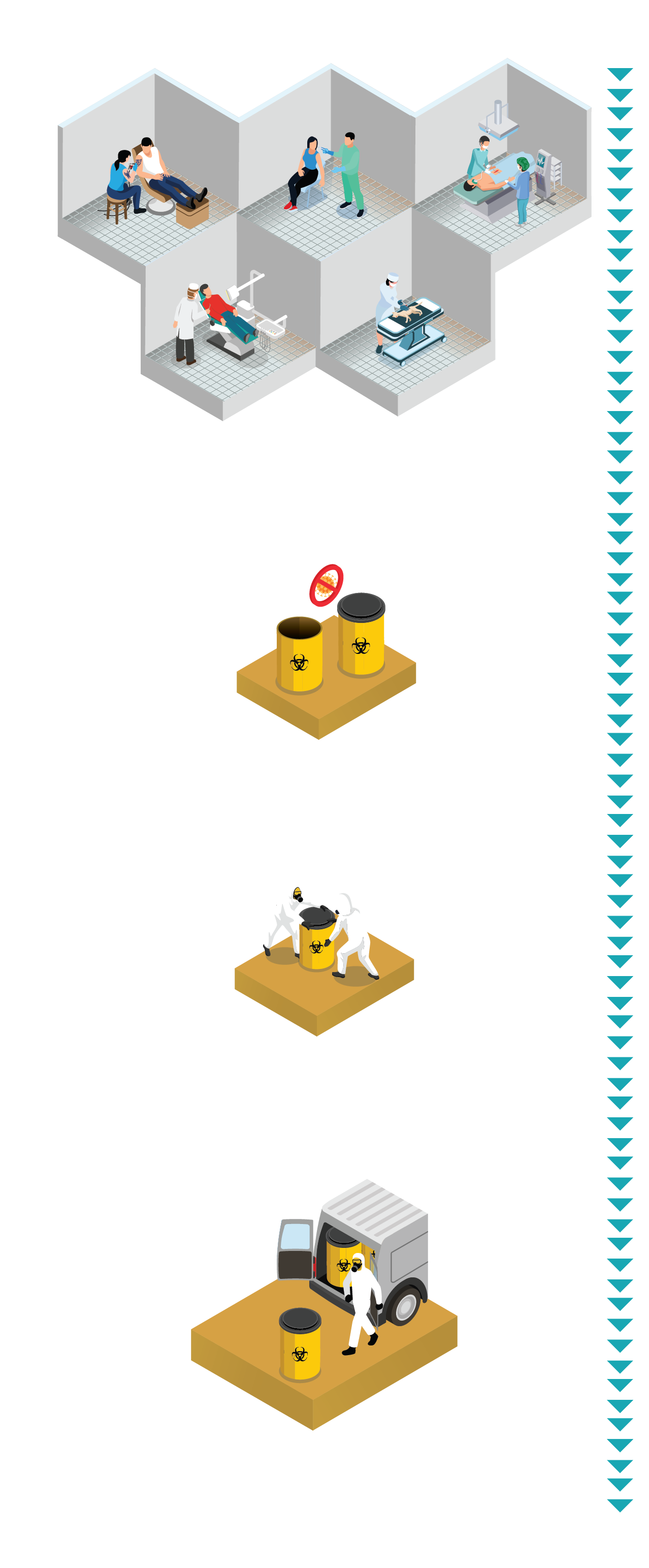The collection, transportation and treatment of hazardous hospital waste (hospital waste) follows several legal standards that must be complied with, which is why it is essential that this service is provided by qualified professionals, given the specific nature of this type of waste, as its incorrect management can constitute a major environmental and public health problem.


THE DEATHCLEAN®, through its specialized division, DECONWASTE offers the collection and transportation service for hospital waste (biological risk waste), in response to specific or regular requests (contract), where we provide approved and appropriate containers for their proper packaging, for subsequent collection, transportation and destruction.
DO YOU PRODUCE HOSPITAL WASTE? WE COLLECT IT.
We carry out the appropriate management of your hazardous waste, complying with all legal requirements and providing a close, quality service.
To get your quote, simply and quickly, simply fill out our form:
HOSPITAL WASTE

According to the Portuguese Environment Agency, hazardous waste is mainly produced in the industrial and healthcare sectors, but also in agriculture, commerce, services and even in the homes of ordinary citizens. Due to its danger to both human health and the environment, it must be managed correctly.
GROUP I


The following examples are classified as Group I waste – Waste Equivalent to Urban Waste:
- Paper, cardboard, glass, ferrous and non-ferrous metals, batteries (accumulators);
- Common packaging and wrapping;
- Waste resulting from food preparation and common dining rooms;
- General services (offices, meeting and social rooms, common sanitary facilities);
- Support services (workshops, warehouses);
- Hotel/catering services.
GROUP II


The following examples are classified as Group II waste – Non-Hazardous Hospital Waste:
- Orthopedic material, uncontaminated and without traces of blood;
- Disposable diapers and pads, uncontaminated and without traces of blood;
- Uncontaminated empty packaging and wrappings of medicines;
- Uncontaminated serum vials;
- Non-contaminated personal protective equipment.
GROUP III


Group III includes all hospital waste with biological risk, i.e. all contaminated waste, waste suspected of contamination or waste with traces of blood. The following are classified as Group III waste:
- Personal protective equipment used in healthcare and general support services where there is contact with contaminated products;
- Disposable diapers and pads contaminated or with traces of blood;
- All waste from wards of infectious or suspected patients, haemodialysis units, operating theatres, treatment rooms, autopsy and pathological anatomy rooms, clinical pathology and research laboratories, with the exception of those in Group IV;
- Unidentifiable anatomical parts;
- All waste containing blood.
Group III biological risk waste is subject to pre-treatment by autoclaving, in a unit licensed for this purpose.
GROUP IV


Group IV consists of specific hospital waste, such as:
- Sharp and piercing materials: needles, catheters and all invasive material;
- Scalpel and razor blades;
- Identifiable anatomical parts, fetuses, placentas, limbs and organs;
- Cadavers of laboratory experiment animals.
Specific hospital waste from Group IV is subject to treatment by incineration.
THE WASTE COLLECTION PROCESS

There are several entities that produce hospital waste, from public to private companies, such as hospitals, clinics, health centers, nursing centers, drug addiction treatment centers, hemodialysis and clinical analysis laboratories and private medical practices.
In addition to the medical sector, places where tattoos are performed, alternative medicines such as acupuncture, funeral homes that have rooms for preparing bodies, among others, are also producers of hospital waste and the law requires a current contract with a company that manages this waste.

THE DEATHCLEAN® , through its specialized division, DECONWASTE is a hospital waste management operator duly licensed and authorized by the competent authorities, to provide the service of collection and transportation of hazardous hospital waste. Discover our specialized division:
OTHER HAZARDOUS WASTE

According to the Portuguese Environment Agency, hazardous waste is identified based on its properties and classification criteria established by law (European Waste List, published by Commission Decision 2014/955/EU of 18 December).
FEMININE HYGIENE WASTE


In accordance with current legislation regarding health and safety at work, DEATHCLEAN® provides an excellent service in the collection of feminine hygiene waste. This service was created to provide adequate and high-level hygiene to sanitary facilities, with the aim of minimizing the risk of blocked pipes and health problems.
We provide regular visits by our technicians to the facilities, according to the particular needs of each client, providing suitable sanitary containers for the storage of this waste, with the use of germicidal and deodorizing plates.
LABORATORY CHEMICAL WASTE


The laboratory chemical collection service (PQL) is suitable for research laboratories, water analysis laboratories, colleges, schools, among others.
DEATHCLEAN INTERVENTION


COLLECTION AND TRANSPORTATION
Using approved containers for hazardous waste.

WASTE MANAGEMENT
Licensed for hazardous waste collection and transportation operations.

MESSAGE SERVICE
Sending alert notification with waste collection schedule.

LEGAL COMPLIANCE
Duly authorized by the competent authorities, in accordance with the legislation.
RELATED SERVICES

HOSPITAL WASTE COLLECTION
The collection, transportation and treatment of hazardous hospital waste (hospital waste) follows several legal standards that must be complied with, which is why it is essential that this service is provided by qualified professionals, given the specific nature of this type of waste, as its incorrect management can constitute a major environmental and public health problem.
THE DEATHCLEAN®, through its specialized division, DECONWASTE, offers the collection and transportation service for hospital waste (biological risk waste), in response to specific or regular requests (contract), where we provide approved and appropriate containers for their proper packaging, for subsequent collection, transportation and destruction.
We also have solutions for the collection of unconfined or improperly packaged hazardous waste, carrying out the appropriate sorting, subsequent packaging in containers, collection and transportation of hazardous hospital waste to a licensed operator. All services are carried out using an e-GAR (Electronic Waste Tracking Guide), in compliance with all current legislation, in accordance with Ordinance No. 28/2019, of January 18.
Hire a qualified company to collect and transport this waste. This will protect you and avoid legal problems.

DO YOU PRODUCE HAZARDOUS HOSPITAL WASTE? WE COLLECT IT.
We carry out the appropriate management of your hazardous waste, complying with all legal requirements and providing a close, quality service.
To get your quote, simply and quickly, simply fill out our form.
HOSPITAL WASTE
According to the Portuguese Environment Agency, hazardous waste is mainly produced in the industrial and healthcare sectors, but also in agriculture, commerce, services and even in the homes of ordinary citizens. Due to its danger to both human health and the environment, it must be managed correctly.
According to Decree-Law No. 73/2011, of June 17, which amends Decree-Law No. 178/2006, of September 5, hospital waste is defined as:
“Waste resulting from health care activities for humans or animals, in the areas of prevention, diagnosis, treatment, rehabilitation or research and teaching, as well as from other activities involving invasive procedures, such as acupuncture, piercings and tattooings”.
Hospital waste (hospital waste) according to Order No. 242/96, of August 13, is divided into 4 groups: Group I, II, III and IV.

GROUP I – WASTE EQUIVALENT TO URBAN WASTE
The following examples are classified as Group I waste:
- Paper, cardboard, glass, ferrous and non-ferrous metals, batteries (accumulators);
- Common packaging and wrapping;
- Waste resulting from food preparation and common dining rooms;
- General services (offices, meeting and social rooms, common sanitary facilities);
- Support services (workshops, warehouses);
- Hotel/catering services.

GROUP II – NON-HAZARDOUS HOSPITAL WASTE
The following examples are classified as Group II waste:
- Orthopedic material, uncontaminated and without traces of blood;
- Disposable diapers and pads, uncontaminated and without traces of blood;
- Uncontaminated empty packaging and wrappings of medicines;
- Uncontaminated serum vials;
- Non-contaminated personal protective equipment.

GROUP III – BIOLOGICALLY RISK HOSPITAL WASTE
Group III includes all hospital waste with biological risk, i.e. all contaminated waste, waste suspected of contamination or waste with traces of blood. The following are classified as Group III waste:
- Personal protective equipment used in healthcare and general support services where there is contact with contaminated products;
- Disposable diapers and pads contaminated or with traces of blood;
- All waste from wards of infectious or suspected patients, haemodialysis units, operating theatres, treatment rooms, autopsy and pathological anatomy rooms, clinical pathology and research laboratories, with the exception of those in Group IV;
- Unidentifiable anatomical parts;
- All waste containing blood.
Group III biological risk waste is subject to pre-treatment by autoclaving, in a unit licensed for this purpose.

GROUP IV – SPECIFIC HOSPITAL WASTE
Group IV consists of specific hospital waste, such as:
- Sharp and piercing materials: needles, catheters and all invasive material;
- Scalpel and razor blades;
- Identifiable anatomical parts, fetuses, placentas, limbs and organs;
- Cadavers of laboratory experiment animals.
Specific hospital waste from Group IV is subject to treatment by incineration.
THE WASTE COLLECTION PROCESS
There are several entities that produce hospital waste, from public to private companies, such as hospitals, clinics, health centers, nursing centers, drug addiction treatment centers, hemodialysis and clinical analysis laboratories and private medical practices.
In addition to the medical sector, places where tattoos are performed, alternative medicines such as acupuncture, funeral homes that have rooms for preparing bodies, among others, are also producers of hospital waste and the law requires a current contract with a company that manages this waste.

THE DEATHCLEAN®, through its specialized division, DECONWASTE, is a hospital waste management operator duly licensed and authorized by the competent entities, to provide the service of collection and transportation of hazardous hospital waste. Get to know our specialized division:
OTHER HAZARDOUS WASTE
According to the Portuguese Environment Agency, hazardous waste is identified based on its properties and classification criteria established by law (European Waste List, published by Commission Decision 2014/955/EU of 18 December).
The hazardous characteristics of waste are set out in Commission Regulation (EU) No 1357/2014 of 18 December and in Council Regulation (EU) 2017/997 of 8 June.
Incorrect management of hazardous waste can lead to environmental and public health problems, with the product being solely responsible for its classification and final destination.

FEMININE HYGIENE WASTE
In accordance with current legislation regarding health and safety at work, DEATHCLEAN® provides an excellent service in the collection of feminine hygiene waste. This service was created to provide adequate and high-level hygiene to sanitary facilities, with the aim of minimizing the risk of blocked pipes and health problems.
We provide regular visits by our technicians to the facilities, according to the particular needs of each client, providing suitable sanitary containers for the storage of this waste, with the use of germicidal and deodorizing plates.

LABORATORY CHEMICAL WASTE
The laboratory chemical collection service (PQL) is suitable for research laboratories, water analysis laboratories, colleges, schools, among others.
Laboratory waste treatment is required because there are products that a laboratory needs to dispose of. The demand for this service is due to the need to treat obsolete reagents, i.e. liquid or solid products, that no longer meet the needs of the respective entity and are therefore not in a condition to be used, due to their expiration date, being damaged, containing eligible labels or whose formula has been improved, among others.
Given the toxic, flammable, corrosive and reactive characteristics that these products may present, it is necessary to hire a company that manages this waste in order to ensure sustainable development, respecting the environment and taking into account public health and safety.
THE DEATHCLEAN® provides the collection and transportation service for these chemical products, delivering them to an operator licensed to treat this type of waste, in accordance with current legislation.
DEATHCLEAN INTERVENTION
THE DEATHCLEAN® offers a complete, quality service, adapted to the needs of each client, in response to specific or regular requests.

COLLECTION AND TRANSPORTATION
Using approved containers for hazardous waste.

WASTE MANAGEMENT
Licensed for hazardous waste collection and transportation operations.

MESSAGE SERVICE
Sending alert notification with waste collection schedule.

LEGAL COMPLIANCE
Duly authorized by the competent authorities, in accordance with the legislation.
RELATED SERVICES





